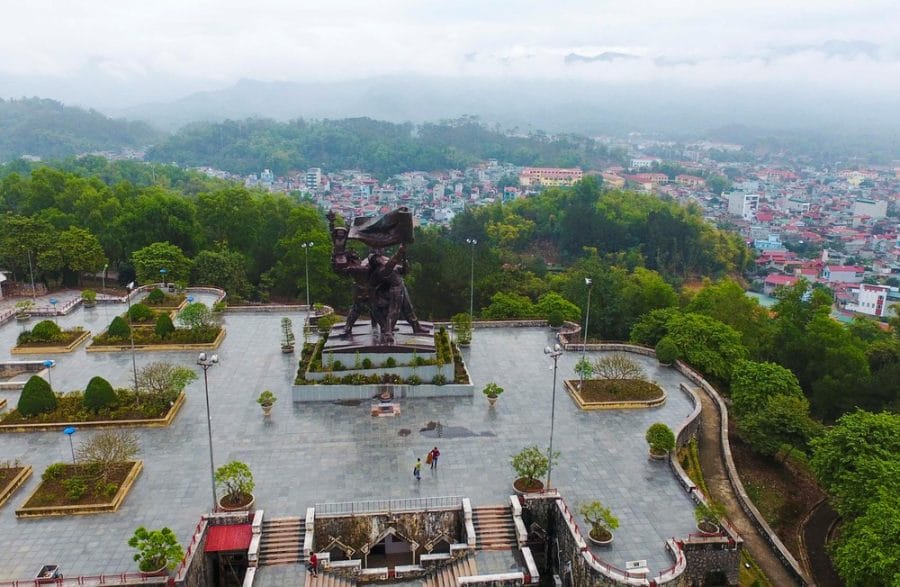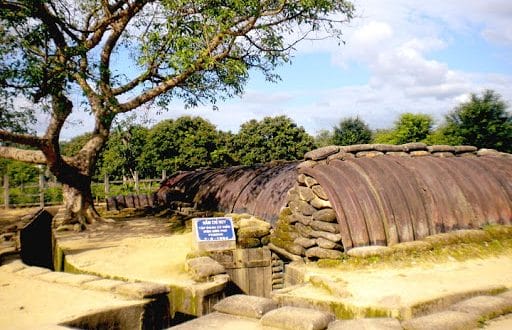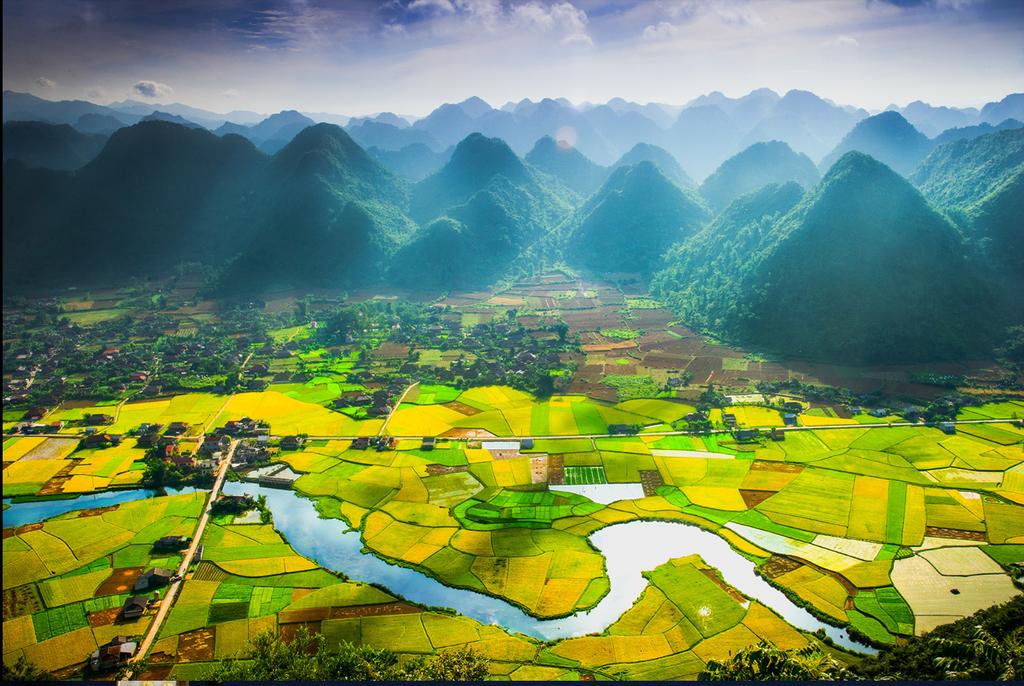Dien Bien is a mountainous border province in the northwestern of Vietnam. It’s about 500 km west of Hanoi. Lai Chau is bounded to the north, Son La province to the east and north-east, Van Nam province to the northwest and to the west and southwest by Laos.
How is Dien Bien attractive tourist?
This Province is rich in tourism potential, especially in the field of culture – history. The most prominent is the historic Dien Bien Phu victory system, including Dien Bien Phu – Muong Phang campaign headquarters; Him Lam, Ban Kao, Independent; The hills of A1, C1, D1, E1 and the center of the conglomerate of France (Dezac Tunnel). This complex is an extremely valuable resource for tourism development not only in this province but also in the North West.
History
By the sixth and seventh centuries in Yunnan (China), Nanzhao was born. The disputes between Nanzhao and other ethnic groups often followed, resulting in unstable South China and north Indochina. During this period, Muong Thanh land experienced many changes. In the 11th and 12th centuries, the Black Tai follow Muong Om, Muong Ai and Muong Lo occupy Muong Lo (Nghia Lo) and from Muong Lo. Later, these people follow their leader, Pu Lang Khong Than Uyen, Van Ban… And finally, own a whole area from Muong Lo (Nghia Lo) through Muong La (Son La) to Muong Thanh (Dien Bien).
In the 15th century. The Hung Hoa town was established (including three area: Quy Hoa, Gia Hung, and An Tay). However, the basic Lu commanders still own Muong Thanh. From 1466 onwards, Le Thanh Tong ordered 12 legacies, of which Hung Hoa consisted of three divisions, four districts, and 17 continents. In 1831, Minh Mang changed to Hung Hoa province. The province was located in Hung Hoa town, Tam Nong district (now in Phu Tho province).
In the French colonial period, Hung Hoa was divided into Hoa Binh, Son La, Lai Chau, Lao Cai, and Yen Bai provinces and separated some districts into Phu Tho. The name Dien Bien was set in 1841 by Thieu Tri from Bien Bien. Dien means power and Bien means border. Dien Bien is the frontier region of the country, Dien Bien Phu (ie Dien Bien Phu) Thieu Tri period consists of three continents: Ninh Bien (by the government, ie, tri-cum management), Tuan Giao and Lai Chau. The name of Dien Bien or Dien Bien Phu appears from there.
In 1858, the French colonialists began invading our country with the attack on the Son Tra Peninsula, Da Nang, but it was not until 1890 French colonialists managed to rule in Lai Chau (including Dien Bien and Lai Chau nowadays). Lai Chau except for Phong Tho of the Fourth Army, directly located in the Van Bich military zone. During a long time, Lai Chau dominated the French colonialists put Dien Bien under military administration, the head of Dien Bien is a martial arts. On May 7, 1954, with the victory of Dien Bien Phu, Vietnam officially gained independence from the French colonialists.
When is the best time to travel?
Travel to Dien Bien Phu on the occasion of Dien Bien Phu Victory day 7/5 to enjoy themselves and enjoy the Dien Bien people in this special occasion. However, this holiday Dien Bien especially crowded by the delegation in large numbers. On this occasion you should book a hotel in Dien Bien Phu before 1-2 months.
- Around the third month of the calendar is the season of flowers blossoming northwest.
- In December, the National Highway No.6 to Dien Bien Phuoc flower bloomed on two sides of the road.
- Going around August and September to combine rice harvesting season in other areas such as Mu Cang Chai, Sa Pa.
- If traveling in November to combine to see the flowers in Moc Chau.
How to get there?
Dien Bien is quite far from Hanoi (about 500km to Dien Bien Phu City) so the time to go to Dien Bien is quite long. There are currently only two ways to get to Dien Bien by road or air.
Travel by road trip
The bus runs daily at My Dinh Bus Station, the car runs about 12-13 hours. Traveling by bed is another advantage that can send a motorbike. If you do not like to go by car you can also schedule a motorcycle trip straight from Hanoi to Dien Bien, with a distance of 500km you will take a whole day to move straight.
Travel by airplane
Currently, Vietnam Airlines Vasco is the only airline to operate the Hanoi – Dien Bien flight. The aircraft used for this flight is ATR 72 with a frequency of 2 flights a day. The time to fly to Dien Bien is only about 1 hour so it will save much more than going by car.
Transportation
This province is a popular destination for tourists to visit Dien Bien Phu relics. Mainly visitor come here are old so mainly transfer by taxi. There are a number of units that started to rent motorbike services in Dien Bien but not much, you can refer to the article below.
Accommodation
With a large area, the district is very far away. But the system of accommodation in Dien Bien is quite full. All districts have hotels and guest houses that can serve visitors on the way to the city. Particularly in the City, there are nearly 100 accommodation establishments with all kinds of hotels, inns, homestay can welcome thousands of tourists simultaneously.
What to see?
Victory Monument of Dien Bien Phu
Dien Bien Phu battlefield relics are a collection of historical relics that record the victories of Vietnamese troops and soldiers during the heroic resistance against the French colonialists. The prominent relics of the old battlefield of Dien Bien are the hills of A1, C1, C2, D1, Hong Cuc, Him Lam, Doc Lap, Muong Thanh bridge and airport, the commander of General Catri.

Dien Bien victory monument
Victory monument Dien Bien Phu consists of 3 standing soldiers, raising a Thai baby, the top is decisive victory. The statue is 16.6m high, brass material, reinforced concrete structural gut, weighing 220 tons. The Dien Bien Phu Victory Monument located on D1 Hill is located at the center of City.
Hill A1
Hill A1 is located in Muong Thanh ward. One of the most important base in the conglomerate of French colonialists. It is located in the direction of Northwest – Southeast, including 2 peaks: Northwest is higher than 490m, Southeast is 493m higher. A1 is the symbol that the Vietnamese army places on the hill. On the morning of May 7, 1954, the Vietnamese army captured the A1 hill.
Martyr’s Cemetery Hill A1
The A1 Martyrs’ Cemetery, a few hundred meters south of the historic Hill Point, was built in 1958. There are 644 graves of soldiers who have died in the Dien Bien Phu campaign. Most of them are unknown tombs, with only four graves named heroic martyrs.
General Director of Do Cat tunnels
General Director of Do Cat is located at the center of the Dien Bien Phu fortress cluster, in Muong Thanh field, Dien Bien district, Dien Bien province. The structure and layout of the tunnel are still intact. Around the tunnel is a defensive line with dense barbed wire and four tanks. Sand Dune is 20m long and 8m wide, including four space for both working and accommodation.

Dien Bien Phu Campaign Commander
Dien Bien Phu Campaign Commander is located in a primeval forest in Muong Phang Commune. It’s about 25 km east of Dien Bien Phu City. This is the work of comrade Vo Nguyen Giap, Hoang Van Thai … Close to the headquarters with the observation tower on the top of the altitude over 1,000m. This observation tower can cover activities and developments in Muong Thanh valley.
Dien Bien Phu Victory Museum
Situated in Pho 1 Street, Muong Thanh Ward. The museum was built in 1984 on the occasion of the 30th anniversary of the historic victory of Dien Bien Phu.
At the end of 2003, Dien Bien Phu Museum upgraded and revisited the exhibition. Presently, the museum has 5 exhibits with 274 artifacts and 122 paintings by each owner.
Muong Thanh Bridge
The bridge is a military facility located in the central division of the Dien Bien Phu fortress cluster. Muong Thanh iron bridge is a ready-made bridge and transported from France to Dien Bien. The entire bridge is 40m long, 5m wide.
Community tourist spots in Dien Bien
Community tourism is increasingly chosen by many domestic and international visitors as the preferred type of tourism. Coming to Dien Bien, you can experience community tourism in cultural tourism. Here, you will be immersed in the living space of ethnic minority people, learn the traditional cultural values, rich indigenous nuances of the Northwest highlands, enjoy folk songs, unique people and explore culinary culture with delicious dishes prepared by the people in the village.






